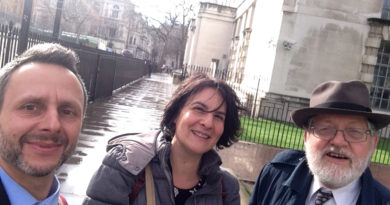What happens to EU citizens in UK after the ‘settled status’ deadline
In the past weeks more than 50 MPs, the Mayor of London, the Scottish government and over 40 charities have called on the British government to stop the countdown and give EU nationals more time to apply for their post-Brexit residence status. That did not produce any effect.
June 30 was and remained the date by which citizens from the European Union (except for Ireland), Norway, Iceland, Liechtenstein and Switzerland who were living in the UK before 31 December 2020 had to apply for ‘settled status’ to be able to stay in the country.
Those who do not apply on time risk becoming unlawful and lose their rights and benefits in the country.
The government considers the scheme a “great success”. The Home Office expected between 3.5 and 4.1 million people (EU citizens and their family members) to be eligible. By the end of June, more than 6 million had applied with requests submitted at a rate of 10,000 per day in the second half of the month.
Immigration Minister Kevin Foster considers the “sheer volume of applications” an evidence that the “vast majority” of those entitled to the new status have applied. In addition, the scheme has been open for more than two years, longer than EU member states have given British citizens to register, he argued in a series of parliament interventions.
But the UK does not have a population register, so no one knows how many people were supposed to apply and the 6 million figure does not necessarily reflect the number of EU citizens in the country. Many may have got settled status and left, others previously unaccounted for may have arrived at the last minute, and people used to move between countries may have decided to play safe and submit the application.
Thousands of people, however, could have been left out. “Even if you have a 1% failure… we already talk about 50,000 individuals,” said Catherine Barnard, Professor of EU and labour law at the University of Cambridge.
Of the processed applications at the end of June, more than 2.8 million (52%) received settled status and over 2.3 million (43%) pre-settled status, a legal position with fewer rights that will have to be converted into full settlement at a later stage. Over 500,000 applications were pending and 109,000 were refused.
What will happen to each of these groups after June 30?
1. Those who have not applied will be unlawful
As of July 1st, eligible citizens who have not applied for the EU settlement scheme will not have legal status in the UK, even if they have lived and worked in the country for many years.
According to citizens’ rights groups, the categories most at risk are children, people in care, victims of domestic abuse and modern slavery, people with mental health issues, homeless people and minorities such as the Roma.
Also in danger are long-term residents who wrongly believed they did not need to apply, individuals with limited language and digital skills, and others who may have not been aware about the scheme.
Many of them will not realise they have become unlawful until they come into contact with GPs, employers, landlords and other service providers who have to check their immigration status.
Others may have tried but failed to apply, for example if they were shielding from coronavirus, if they could not renew expired IDs or passports in time, or simply because of technical reasons. Only in the last week of June the Home Office made digital applications available to those with expired identity documents, sparing them of the cumbersome paper procedure.
The government said that people with ‘reasonable grounds’ for missing the deadline, including people with prior residence documents, children whose carers have not applied for them, people with reduced mental and physical capacity, victims of abuses and ‘other compelling practical or compassionate reasons’, will have the chance to apply later.
Minister Foster told the House of Lords European affairs committee that those caught without status will receive a notice with the request to apply within 28 days. But they will still have to prove they had good reasons for being late, said Mark Lazarowicz, chair of the Citizens’ Rights Project, one of the organisations supporting EU citizens in Scotland.
In addition, between the deadline and the time of the late application, they will have no residence rights.
Caitlin Boswell, policy and advocacy advisor at the Joint Council for the Welfare of Immigrants (JCWI), told Europe Street that this will have “disastrous consequences” on people’s lives. “EU citizens fleeing domestic abuse who miss the deadline and then make a late application won’t be eligible for homelessness assistance until they receive a successful grant of status. This could take months and, in the meantime, will push people back into the hands of abusers or destitution”.
The Scottish government said it will use its devolved powers to ensure that EU citizens who fell through the cracks will continue accessing services such as healthcare, education and housing.
Several organisations are asking to make the system more flexible to avoid that thousands of people lose their rights. “Instead of risking people’s safety, the government must lift the deadline and grant automatic rights,” Boswell argued.
Update: on August 6 the British government announced that EU citizens in the UK who missed the deadline to apply to the EU settlement scheme will be given the chance to apply and will have their rights protected until a decision has been made on their application.
2. Children can apply late
The situation could be particularly difficult for EU children, who may accidentally lose the right to live, study and, in the future, work in the UK, even if they were born in the country.
Support groups found that many parents were unaware that their children needed to apply to the EU settlement scheme. Many think incorrectly that children born in the UK have the automatic right to British citizenship. Even those who knew may have underestimated the lenght of the procedure, especially if it required going to an embassy to apply for the children’s passport during the pandemic.
Campaigners are also concerned about children in care or in foster homes as only 67% had applied for status by the end of April.
The government said that late applications from children will be accepted at any time, even “10 or 13 years in the future,” minister Foster explained.
But the later the date, the less likely the application will succeed as whenever they make the request, children will need to “show that they met the basic eligibility conditions at the end of 2020” and “demonstrate continuous residence since that point,” a report by the UK in a Changing Europe says.
3. Hundreds of thousands waiting for a decision
People who have applied on time but are waiting for the decision, about 400,000 according to recent data published by The Guardian, also risk being in trouble.
Pending decisions are usually due to complex cases and may take months to resolve. They could be related to non-EU family members and carers of EU citizens, two groups that have experienced a higher proportion of refusals (7%).
They may also concern people who committed criminal offenses and with outstanding prosecutions. “The Home Office cannot proceed to decide the application until those matters have been brought to a conclusion, given that the offence involved would inevitably affect their status,” the minister said.
These groups should continue benefiting of the current rights using the certificate of application as a proof of their status, at least until the decision is made. But renting a flat, being offered for a job or getting a mortgage may prove difficult for persons whose future in the country looks uncertain.
4. The transition from pre-settled status
Problems can emerge also for people with pre-settled status. While settled status is obtained after 5 years of continuous residence, EU citizens who have lived in the UK for less than that are eligible for pre-settlement and can complete the 5-year residence period to obtain full status.
During this time, however, they might have fewer rights. The government is currently denying them welfare benefits such as universal credit, although the Court of Appeal ruled in December they should be treated equally. In an unexpected development, the EU Court of Justice ruled in July this is not discriminatory.
EU citizens with pre-settled status are also allowed to leave the country for 6 continuous months (up to 12 months for an “important reason” such as Covid-19) and 2 years in total without losing the right to apply to settlement.
Once completed the 5-year period, they will have to submit a new application. If they let their status lapse, they will lose their right to apply for settlement.
“We will go from one cliff edge on June 30 to more than two million cliff edges over time, as individuals will face their own deadlines to complete the procedure,” said Maike Bohn, co-founder of the3million, a group defending the rights of EU citizens in the UK.
Minister Foster said the Home Office “will take a proactive approach of seeking to remind people” when the new application is due but he added that “it would be difficult to go to an automatic conversion” as people may have left the country in the meantime.
The potential consequences of this loss of rights will be extreme and extend beyond the individual. Andrei Savitski, a service provider at the Work Rights Centre, warned that when EU nationals can’t transition from pre-settled to settled status, it is also their non-EU family members who lose their right to live in the UK. “This includes children, who may have gotten used to life in the UK or may have lived here their entire lives,” he said.
5. Fading support
Throughout the process, vulnerable groups will be the most at risk. In the past two years the Home Office has provided help opening the EU Settlement Resolution Centre and funding 72 organisations with £21.5 million to reach eligibile people and accompany them in the application. Over 310,000 individuals have been directly supported, Foster said.
Financial support to these organisations will continue until “at least the end of September 2021,” the minister confirmed. After that date, however, there is no certainty, although vulnerable people will have to continue submitting late applications, converting from pre-settled to settled status and updating their details when necessary.
6. All EU citizens will face the hostile environment
As for people who have obtained settled status without any problem, they will also face “almost inevitably” differences in treatment compared to UK nationals, the UK in a Changing Europe says.
Instead of just showing an identity document, from July 1st EU citizens will have to prove their legal status every time they change job or rent a flat and they may requested evidence of their position when they apply for public or private services. This is because under the ‘hostile environment’ policy, the government requires landlords, employers, councils, GPs, hospitals, schools, banks, estate agents and similar entities to check the legal position of the people they hire, rent to or support, or face hefty fines.
To prove their status, EU citizens will have to request a code on the government digital platform and share it with the service supplier for verification. The code will be valid for 30 days, so a new code will have to be requested at each occasion.
The government has issued guidelines clarifying that employers and landlords do not need to conduct retrospective checks on EU citizens currently employed or in tenancy agreements. “If they do come across someone who hasn’t applied, they should encourage them to apply as quickly as possible and can contact Home Office checking services to obtain a reasonable excuse to continue employing or renting to [these] individuals,” minister Foster said.
But citizens’ rights groups fear that the lack of knowledge about these rules, and their complexity, will lead to discrimination.
“The only way to prevent EU nationals from falling through the cracks of a digital platform would be to offer them the option of physical proof,” said Dr Dora-Olivia Vicol, director at the Work Rights Centre.
The3million has campaigned for years for a physical document to complement the digital status, at least on a voluntary basis. They even attempted a legal challenge, which the High Court dismissed in May.
The government has so far refused to issue paper documents because of their cost and as a matter of principle. “We are developing a border and immigration system that is digital by default. That means that over time we will increasingly replace physical and paper-based documents, some of which can be many years old, with easy-to-use, accessible online and digital services,” minister Foster told MPs earlier in June.
Foster argued that, unlike a physical document, the digital status cannot be lost, stolen or “retained by someone who is seeking to exploit or abuse it”.
But there may be other solutions. The3million call for a document similar to the Covid-19 vaccine certificate, which allows people to show their status on the phone or download and print a PDF version.
7. A series of legal challenges
Several elements of the settled status scheme have been challenged in court in the past two years and more lawsuits are likely to follow.
Courts have so far ruled against the government on the right to welfare benefits for people with pre-settled status and what is considered an ‘important reason’ for absences of more than 6 months. A recent ruling also established the rights of Zambrano carers, non-EU citizens who look after British nationals in the UK after having exercised free movement in the EU.
An Independent Monitoring Authority has been established to oversee how public bodies comply with the withdrawal agreement in relation to the rights of EU citizens. The authority can open inquiries and try to correct ‘systemic problems’ but not resolve individual cases.
The European Union is also following the developments. At the joint committee on citizens’ right, which includes representatives of the EU and the UK and oversees the implementation of the Brexit deal, the EU shared concerns about the scheme.
The European Commission and EU member states are worried about the lack of protection for EU citizens who have not applied on time and the possible loss of residence rights in the transition from pre-settled to settled status. The EU does not share “the UK’s interpretation of the withdrawal agreement” and will “carefully consider next steps,” a statement says.
8. Being settled and feeling unsettled
Twelve months after acquiring settled status, EU citizens will be able to apply for British citizenship. Children born in the UK to people with settled status will be British at birth.
But will EU citizens feel ‘settled’ in the UK?
The scheme has created a permanent relationship between them and the Home Office that did not exist under EU free movement rules. From now on, they will have to update their online status every time they change address, phone number or identity document.
If making the application required “a level of digital competence, hardware and internet connectivity… not within everyone’s reach,” the right to reside will become over time “a test in digital literacy,” Dr Vicol said.
The Home Office said forgetting to update the details will not lead to a loss of rights, but it is unclear whether this could cause difficulties at the border.
There will be the uncertainty of depending on a digital platform with possible technical glitches, the3million denounced.
Close family members and partners will be able to join EU citizens in the UK as long as the relationship existed before 31 December 2020, a benefit EU nationals maintain compared to many other families separated by income requirements, visa fees and healthcare costs. But relationships formed in the future will be subject to harsh hostile environment policies.
Time spent abroad will count too. Individuals with settled status can leave the UK for up to five years without losing their rights (four years for Swiss citizens and their family members). However, the British government has the power to change this by secondary legislation, the UK in a Changing Europe notes.
Elena Remigi, founder of the In Limbo project, a collection of testimonies of EU citizens in the UK and British citizens in the EU, says an analysis of keywords recently shared in their Facebook group showed “unsettled” as that the dominant word.
“A period of great uncertainty will open after the settled status deadline, with many people in a precarious legal situation,” she told Europe Street.
A survey among EU citizens conducted earlier this year by the Independent Monitoring Authority showed that 30% of respondents were not confident their rights will be upheld. One in 4 felt they were not treated equally to UK citizens and 10% said the digital nature of their status was already leading to discrimination.
Claudia Delpero © all rights reserved
The article was first published on 30 June 2021 and was updated on 15 August 2021 with the EU Court of Justice ruling and the UK government announcement on late settled status applications. Photo by Luigi Manga on Unsplash
Europe Street News is an online magazine covering citizens’ rights in the EU and the UK. We are fully independent and we are committed to providing factual, accurate and reliable information. As citizens’ rights are at the core of democracy, our website and newsletter are available for free. Please consider making a contribution so we can continue and expand our coverage. Thank you!





